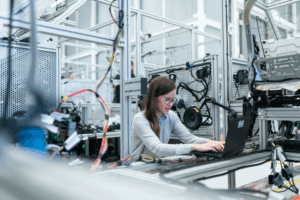
Thriving or Surviving? The Manufacturing Sector Health Check – February 2026
UK manufacturing is showing cautious signs of stabilisation, according to Enginuity’s latest “Thriving or Surviving?”

Manufacturers across the engineering sector are facing a growing pressure to rethink how materials from initial design to end-of-life are used. A sustainable industry is a strategic imperative and circularity offers a powerful framework to tackle both environmental responsibility and long-term resilience. Here, Simon Farnfield, event director at Easyfairs, the organisers to Advanced Engineering, explains how going in circles might just be the most progressive move we can make.
Environmental concerns have long loomed over the engineering and manufacturing sectors, but too often they’re treated as obstacles to be worked around rather than opportunities to be seized. Whether it’s supply constraints, cost pressures or legacy systems, companies often look for shortcuts rather than any meaningful action.
Yet circularity is here to stay, with over 550,000 jobs to be created in the sector by 2030. This comes as from 2014 to 2019, the UK’s circular economy grew by nearly 90,000 jobs, reaching 560,000. By 2030, it could cut CO₂ emissions by 33 million tonnes a year and boost the economy by £82 billion, depending on how it develops and links with imports and manufacturing.
As both regulatory and market forces tighten around sustainability, the only viable option is to tackle the topic head on by designing materials and processes for reuse, recycling and traceability, which is what a circular economy is designed to achieve.
Material passporting
A core part of enabling a circular economy is material transparency and lifecycle documentation. By keeping digital records that document the composition, sourcing and recyclability of products manufacturers have the data they need to plan for end-of-life reuse. Having material passports that respect these parameters is set to play a bigger role across engineering value chains because it enables more accurate carbon accounting, while meeting growing customer and compliance demands.
For businesses, it’s not just about ticking boxes, it’s about knowing what’s in your products and where those materials can go next. A deeper material insight has the potential to unlock smarter lifecycle decisions, such as replacing outdated components with more efficient, recyclable alternatives. Tracking material composition from the outset allows businesses to maximising both environmental and economic outcomes by knowing when it’s better to repair, replace or remanufacture.
A circle has no beginning and no end
However, for circularity to work, decisions need to be made as early as the design stage. Here, design teams play a critical role in ensuring that the products of today don’t become the waste of tomorrow. That means specifying compatible materials, avoiding permanent bonding techniques that make disassembly difficult and prioritising components with long-term reuse potential.
Good design is never an afterthought. Incorporating recyclability on the drawing board will pay dividends in the future. This includes not just environmental sustainability, but also long-term job creation in an industry longing to bridge the skills gap. With the right design choices, manufacturers can support a growing ecosystem of service providers and material recovery specialists, encouraging a strategy for competitiveness, regional growth and workforce development.
Keeping track of policy
Regulation is catching up to expectations before you know it. The EU Critical Raw Materials Act sets clear targets for domestic extraction, processing and especially recycling of key inputs like rare earths, lithium and cobalt. By 2030, the EU wants to source at least 25% of its strategic raw materials from recycled content.
To meet that goal, engineering sectors will need to embrace new practices and partnerships. Businesses that begin adjusting now by investing in smarter supply chains, adopting circular principles and tracking materials more transparently will be the ones best placed to thrive.
That’s where industry networking events like Advanced Engineering come in. As a hub for innovative materials specialists and product designers, it’s a place to share strategies, forge connections and stay ahead of emerging regulation. For businesses looking to source sustainable alternatives or implement cradle-to-cradle thinking into their designs, the conversation starts here.
Industry experts will explore the biggest changes and trends in engineering and high-value manufacturing on the Main Stage, with circularity set to feature prominently. Leading companies from sectors, such as composites and aerospace, will share how they’re applying circular principles in practice, offering real-world strategies for attendees to take away.
From net-zero composites to energy-efficient processes, Advanced Engineering is now open for registration. Confirm your spot here: https://www.advancedengineeringuk.com/

UK manufacturing is showing cautious signs of stabilisation, according to Enginuity’s latest “Thriving or Surviving?”

Backed by over £210 million, a new UK Government Cyber Action Plan published today sets out how government will rise to meet the growing range of online threats

Backed by over £210 million, a new UK Government Cyber Action Plan published today sets out how government will rise to meet the growing range of online threats